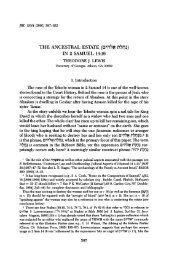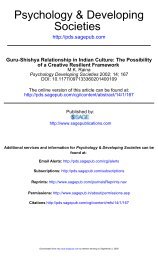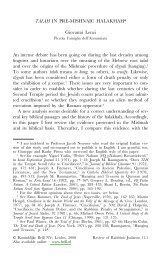Religion, Theology, and Philosophy on the Way to Being and Time ...
Religion, Theology, and Philosophy on the Way to Being and Time ...
Religion, Theology, and Philosophy on the Way to Being and Time ...
Create successful ePaper yourself
Turn your PDF publications into a flip-book with our unique Google optimized e-Paper software.
I. M. Fehér / Research in Phenomenology 39 (2009) 99–131 107<br />
itself, i.e., transcendental c<strong>on</strong>sciousness. 15 Th e world of lived experience knows<br />
of no such duality as that between object <str<strong>on</strong>g>and</str<strong>on</strong>g> knowledge.<br />
If we leap forward <strong>to</strong> Heidegger’s most detailed critique of Husserl’s phenomenology<br />
as provided in <strong>the</strong> 1925 lecture course, we see that its central<br />
<strong>the</strong>me is, <strong>on</strong>ce again, <strong>the</strong> delimitati<strong>on</strong> of <strong>the</strong> specifi c research fi eld of phenomenology<br />
itself, in o<strong>the</strong>r words, <strong>the</strong> self-c<strong>on</strong>cretizati<strong>on</strong> of phenomenological<br />
philosophy out of its own initial principle or maxim. Th e basic issue is related<br />
<strong>to</strong> whe<strong>the</strong>r <str<strong>on</strong>g>and</str<strong>on</strong>g> how phenomenology gets access <strong>to</strong> (comes <strong>to</strong> delimit) its own<br />
research fi eld, whe<strong>the</strong>r <strong>the</strong> procedure <strong>the</strong>reby employed is phenomenologically<br />
coherent or not. Over against <strong>the</strong> charges of dogmatism, as formulated<br />
by Rickert, Heidegger comes <strong>to</strong> <strong>the</strong> c<strong>on</strong>clusi<strong>on</strong>, after detailed analyses, that it<br />
is not intenti<strong>on</strong>ality as such that might legitimately be claimed <strong>to</strong> be dogmatic<br />
but ra<strong>the</strong>r that <strong>to</strong> which intenti<strong>on</strong>ality gets tacitly linked, or bound, or tied,<br />
that which is built under this structure—in o<strong>the</strong>r words, that of which it is<br />
claimed <strong>to</strong> be <strong>the</strong> specifi c structure. In fact, intenti<strong>on</strong>ality is held <strong>to</strong> be <strong>the</strong><br />
specifi c structure of <strong>the</strong> psyche, reas<strong>on</strong>, c<strong>on</strong>sciousness, etc. (ra<strong>the</strong>r than, say,<br />
nature), all of which are <strong>on</strong><strong>to</strong>logical regi<strong>on</strong>s that are naively, i.e., traditi<strong>on</strong>ally<br />
<str<strong>on</strong>g>and</str<strong>on</strong>g> <strong>the</strong>refore dogmatically, assumed ra<strong>the</strong>r than phenomenologically discussed<br />
<str<strong>on</strong>g>and</str<strong>on</strong>g> delimited. Ra<strong>the</strong>r than an ultimate explanati<strong>on</strong> of psychic reality,<br />
Heidegger observes signifi cantly, intenti<strong>on</strong>ality is a way <strong>to</strong> overcome such traditi<strong>on</strong>al<br />
<strong>on</strong><strong>to</strong>logical realities as psyche, c<strong>on</strong>sciousness, reas<strong>on</strong>. 16<br />
Th e questi<strong>on</strong> is whe<strong>the</strong>r access <strong>to</strong> that of which intenti<strong>on</strong>ality is declared <strong>to</strong><br />
be <strong>the</strong> structure is attained in a phenomenological way. Th e issue c<strong>on</strong>cerns <strong>the</strong><br />
delimitati<strong>on</strong> of <strong>the</strong> “thing itself” in a phenomenological way, <strong>the</strong> questi<strong>on</strong><br />
of whe<strong>the</strong>r <strong>the</strong> linking of intenti<strong>on</strong>ality <strong>to</strong> pure c<strong>on</strong>sciousness, or <strong>to</strong> <strong>the</strong> transcendental<br />
ego, is carried out phenomenologically <str<strong>on</strong>g>and</str<strong>on</strong>g> not simply by taking<br />
over <strong>the</strong> leading idea of modern Cartesian-Kantian philosophy—a doubt that<br />
proves <strong>to</strong> be well-founded. 17 Although Husserl claims <strong>to</strong> suspend, put in<strong>to</strong><br />
brackets, “asserti<strong>on</strong>s c<strong>on</strong>cerning being” <str<strong>on</strong>g>and</str<strong>on</strong>g> <strong>the</strong>reby leaves <strong>the</strong> being of intenti<strong>on</strong>ality<br />
obscure, he never<strong>the</strong>less tacitly links it <strong>to</strong> an <strong>on</strong><strong>to</strong>logical regi<strong>on</strong> called<br />
transcendental c<strong>on</strong>sciousness. Moreover, he makes distincti<strong>on</strong>s of <strong>Being</strong> like<br />
<strong>the</strong> <strong>on</strong>e between <strong>Being</strong> as c<strong>on</strong>sciousness <str<strong>on</strong>g>and</str<strong>on</strong>g> transcendent being—which he<br />
15) See GA 20: 159, 178. For <strong>the</strong> same point in his<strong>to</strong>rical perspective going back <strong>to</strong> Descartes, see<br />
GA 17, esp. 105.<br />
16) GA 20: 62ff . “It is a questi<strong>on</strong> of underst<str<strong>on</strong>g>and</str<strong>on</strong>g>ing <strong>the</strong> subject <strong>on</strong> <strong>the</strong> basis of intenti<strong>on</strong>ality,<br />
ra<strong>the</strong>r than underst<str<strong>on</strong>g>and</str<strong>on</strong>g>ing intenti<strong>on</strong>ality <strong>on</strong> <strong>the</strong> basis of prec<strong>on</strong>ceived ideas about <strong>the</strong> subject”<br />
(Rudolf Bernet, “Husserl <str<strong>on</strong>g>and</str<strong>on</strong>g> Heidegger <strong>on</strong> Intenti<strong>on</strong>ality <str<strong>on</strong>g>and</str<strong>on</strong>g> <strong>Being</strong>,” Journal of <strong>the</strong> British Society<br />
for Phenomenology 21 [May 1990]: 143).<br />
17) See GA 20: 147.







